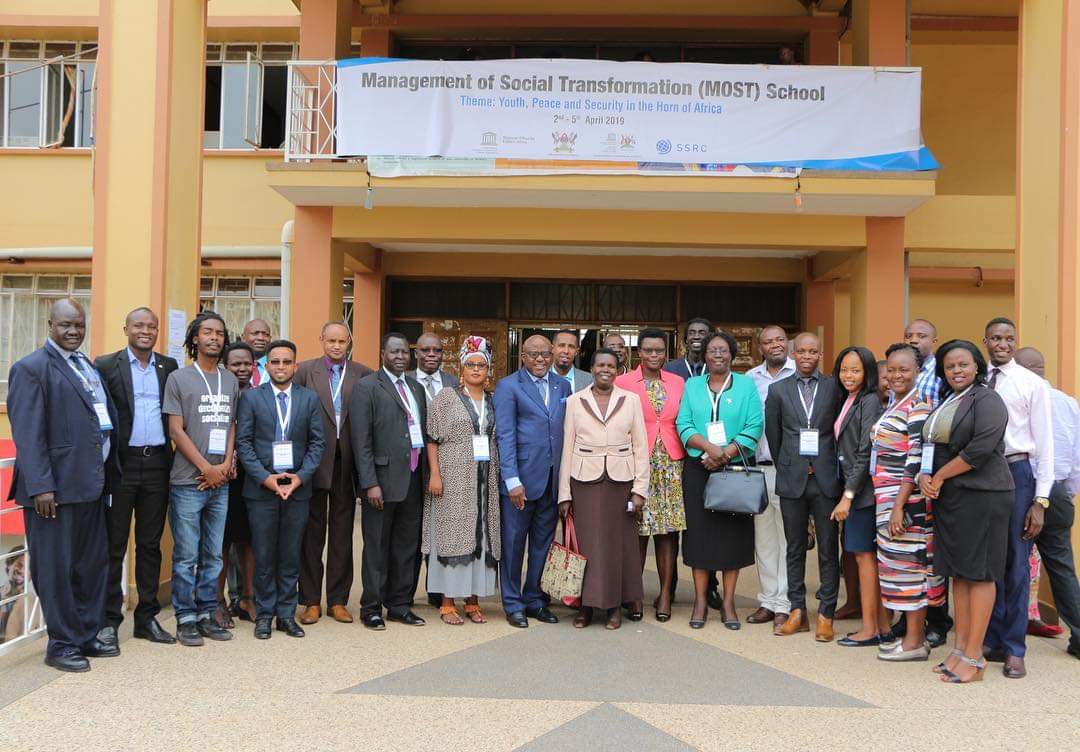Theme: Youth Peace and Security in the Horn of Africa
Makerere University, Kampala-Uganda
2nd -5th April 2019
News Letter
The Lord Mayor of Kampala City Council Authority (KCCA), Erias Lukwago has applauded the United Nations Educational, Scientific and Cultural Organization (UNESCO) for introducing the MOST Schools Initiative, stating that it will go a long way in helping policy makers across the horn of African region region in policy formulation and decision making, leading to Socio-economic transformation in the region.
Lukwago made the remarks on Friday while officiating during the closure of the 4 day MOST School workshop held at Makerere University, on the theme “Youth, Peace and Security in the horn of Africa.” The forum brought close to 40 participants with delegates coming from a host of African countries including South Africa, Kenya, Somali Land, Somalia, Djibouti, The Gambia, Ethiopia and Uganda.
He called upon governments in the Horn of African region to put in place robust structures capable of addressing the needs the young people. “Create systems that can guarantee opportunities for youth to exploit their talents. Once the young people lose hope and grow frustrated, they become disillusioned and therefore pose a big threat to peace and security in any country,” Lukwago added.
According to Lukwago so many youth ‘pronouncements’ and policies have been put in place but they often end up on the ‘shelves’ instead of being translated in to actionable areas addressing concerns of the young people. He therefore called upon delegates attending the MOST Schools workshop to put emphasis on advocating for the implementation and ratification of youth policies in their respective countries.

Dr. Lamin making point during a panel discussion session
The forum was officially opened by the State Minister for Higher Education represented by the Commissioner of TIET, Dr. Jane Egau Oko who noted at the center of all the deliberations, are the youth, young men and women who are both part of today’s reflections on socio-economic development and transformations, and at the same time, hold the keys to unlocking the potentials of tomorrow’s peaceful, secure and inclusive world.
Ms. Rosie Agoi, the Secretary General UNATCOM informed the delegates at the conference that MOST falls under the Social Science Programme of UNESCO and pledge that, the National Commission (Secretariat) will continue to support Management of Social Transformation Schools interventions within Uganda by continuing to advocate for linkages between Research, Policy formulation and Actions.
“MOST works with the government, social and human scientists and civil societies to improve connections between knowledge and action for achieving positive social change in form of poverty eradication, inclusive and sustainable responses to environmental change and the promotion of inclusive, effective and accountable governance,” Rosie added.
Dr. Pamela Khanakwa, a senior lecturer in the Department of History, Archeology and Heritage Studies at Makerere University who was one of the keynote speakers at forum noted that, Social Science Research Council (SSRC) is playing a key role in supporting Research in conflict affected areas of Africa to help in policy formulation.
Dr. Abdu Rahman Lamin, the Social Science Specialist at the UNESCO Nairobi Office while delivering his remarks noted that, Knowledge without policy actions is irrelevant. “A connection between research, policy and action is fundamental for the realization of peace and security in the horn of Africa region,” He added. Research involving the academics is very important for building knowledge and must therefore be translated in policy and action according to Lamin.
Key among issues raised among the young people in Horn of African is region include; unemployment, violent extremism, absence of National of National Youth policies, poor quality education services, among others.
Dr. Dominic Lali Mundrugo-Ogo the Assistant Secretary General of the National Commission for UNESCO called upon the youth to develop a well principled common ideology and rally around it drawing comparison from maxims and socialism, a system of governance characterized by social ownership and democratic control with a constant feature of social and economic equality.
According to Prof. Makara Sabiti of the Department of Political Science at Makerere University, for Peace and Security to prevail in the horn of Africa, 4 key issues must be achieved, namely;
- Leadership building among the young people
- Youth as change agents
- Peace building and conflict mitigation
- Linking youth innovations ideas with research and policy
He further recommended that State institutions must be restructured to be more inclusive and accommodative of young people than they are currently. He noted with concern the inadequate role private sector is playing to address issues surrounding the youth such as inclusion. “The youth should stop being idle and despondent, create space for active engagement through networking and be assertive,” Sabiti cried out.
The Management of Social Transformation (MOST) has four operational pillars, namely;
- Produce a systematic and inclusive access to knowledge
- Deploy systems thinking approaches to foster interdisciplinary methodologies such as sustainability science.
- Promote multi-stakeholder exchanges of knowledge and experiences
- Foster the development of appropriate methods and metrics
The workshop was organized by UNESCO in partnership with Uganda National Commission for UNESCO, Makerere University and Social Science Research Council (SSRC).

Mr. Willis Ombima a Kenyan delegate making a point during the panel discussion session.

